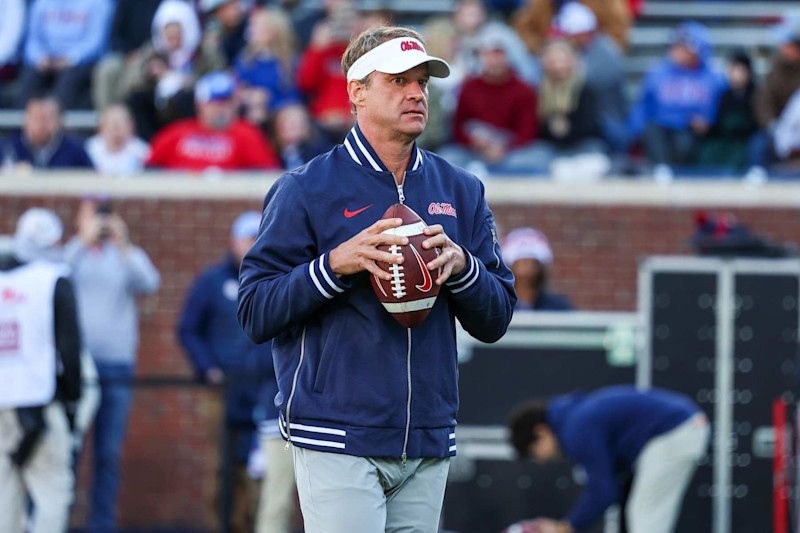Lane Kiffin: ‘It Really is a Dumb System’ to Open Transfer Portal Before Bowls
Lane Kiffin, the head coach of the University of Mississippi football team, has never been one to hold back his opinions, and his latest comments on the timing of the transfer portal have turned heads in the college football world. Kiffin, who has successfully navigated the complexities of the transfer portal in recent years, voiced strong criticism about the timing of when players are allowed to enter the portal, particularly in the weeks leading up to bowl games. His remarks highlight a growing frustration among coaches and fans about how the system is impacting the integrity of college football.
In a recent interview, Kiffin didn’t mince words when he described the system that allows players to enter the transfer portal before bowl games. “It really is a dumb system,” Kiffin stated bluntly. “It’s not fair to the players, to the teams, or to the fans. We are supposed to be playing in these important games, but now we’re dealing with players leaving or potentially not playing because they’re worried about their future.”
The transfer portal, which was implemented to provide players with more freedom to move between programs, has become an integral part of college football, allowing student-athletes to find new opportunities if they’re unhappy with their current team. While it has given players more control over their careers, Kiffin argues that the timing of when players can enter the portal has become problematic. Opening the portal before bowl games, which are some of the most significant matchups of the season, has led to numerous distractions and complications for teams, coaches, and fans.
The issue, as Kiffin sees it, is that many players, especially those in positions that are considered “high-profile” or critical, may choose to enter the portal in the days or weeks leading up to their team’s bowl game. This leaves coaches scrambling to make last-minute adjustments to their rosters and game plans, knowing that some players may not be fully invested in the game if they are already focused on their future with a new program. In some cases, players have opted out of bowl games entirely, fearing injury or simply not wanting to jeopardize their future in the transfer process.
For Kiffin, this disrupts the flow of the postseason and takes away from the traditional meaning of bowl games. College football’s bowl season has long been a time to showcase a team’s growth, and for players to finish their careers with one final display of their talents. The emergence of the transfer portal, coupled with the timing of when it opens, has, in Kiffin’s view, undermined that tradition.
“If a guy is entering the portal, you have no idea if he’s going to play in the bowl game,” Kiffin added. “It’s one thing if it happens after the bowl game, but when it happens before, it really throws everything off. It’s hard to keep a team together when you’re dealing with that uncertainty.”
The problems Kiffin describes are not unique to Ole Miss. Across college football, coaches have expressed similar concerns about the impact of the transfer portal on their teams’ preparation for bowl games. In some instances, key players have opted out of bowl games to protect their draft stock or avoid the risk of injury while transitioning to a new program. While this is entirely within their rights, it can lead to a sense of disarray for the teams involved, especially those playing in high-stakes games.
For Kiffin, who has utilized the transfer portal to bring in talent to Ole Miss, the situation is particularly frustrating because the timing of the portal coincides with an important part of the season. He is known for his ability to leverage the portal effectively, bringing in talented players who can make an immediate impact on the field. However, Kiffin argues that the current timing of the portal forces players to make critical decisions before they’ve had the chance to fully experience their bowl game, which could be their final game with the team.
“The system is backwards,” Kiffin said. “The transfer portal should open after the bowl games. Let the players finish their seasons, play their bowl games, and then make their decisions. We’re asking these kids to make huge life decisions when they should be focused on finishing their season strong and helping their team succeed.”
The open transfer portal has had a significant impact on recruiting as well. Coaches are often left juggling the needs of their current roster while simultaneously recruiting for the future. With players entering and leaving the portal at such a rapid pace, it has created a kind of free agency in college football, which Kiffin believes contributes to the chaos of roster management during bowl season.
While many have praised the transfer portal for offering players more opportunities to find better fits, Kiffin’s comments underscore the need for a balance between player autonomy and the integrity of the college football postseason. The portal’s timing remains one of the most hotly debated issues in college football, and Kiffin’s comments reflect the broader concerns of coaches, players, and fans who feel that the system as it stands is not conducive to the traditional postseason experience.
As college football continues to evolve, it will be interesting to see if changes are made to the timing of the transfer portal. Kiffin’s call for the portal to open after bowl games has gained traction among coaches and analysts, who believe it would preserve the integrity of the postseason while still allowing players to pursue new opportunities. Whether or not changes are implemented remains to be seen, but Kiffin’s scathing critique has certainly brought attention to a growing issue in college football.
